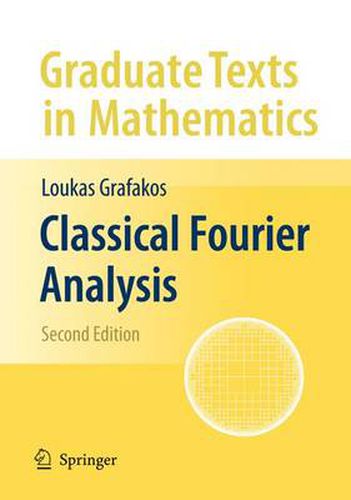Readings Newsletter
Become a Readings Member to make your shopping experience even easier.
Sign in or sign up for free!
You’re not far away from qualifying for FREE standard shipping within Australia
You’ve qualified for FREE standard shipping within Australia
The cart is loading…






This title is printed to order. This book may have been self-published. If so, we cannot guarantee the quality of the content. In the main most books will have gone through the editing process however some may not. We therefore suggest that you be aware of this before ordering this book. If in doubt check either the author or publisher’s details as we are unable to accept any returns unless they are faulty. Please contact us if you have any questions.
The primary goal of this text is to present the theoretical foundation of the field of Fourier analysis. This book is mainly addressed to graduate students in mathematics and is designed to serve for a three-course sequence on the subject. The only prerequisite for understanding the text is satisfactory completion of a course in measure theory, Lebesgue integration, and complex variables. This book is intended to present the selected topics in some depth and stimulate further study. Although the emphasis falls on real variable methods in Euclidean spaces, a chapter is devoted to the fundamentals of analysis on the torus. This material is included for historical reasons, as the genesis of Fourier analysis can be found in trigonometric expansions of periodic functions in several variables.
While the 1st edition was published as a single volume, the new edition will contain 120 pp of new material, with an additional chapter on time-frequency analysis and other modern topics. As a result, the book is now being published in 2 separate volumes, the first volume containing the classical topics (Lp Spaces, Littlewood-Paley Theory, Smoothness, etc…), the second volume containing the modern topics (weighted inequalities, wavelets, atomic decomposition, etc…).
From a review of the first edition:
Grafakos’s book is very user-friendly with numerous examples illustrating the definitions and ideas. It is more suitable for readers who want to get a feel for current research. The treatment is thoroughly modern with free use of operators and functional analysis. Morever, unlike many authors, Grafakos has clearly spent a great deal of time preparing the exercises. - Ken Ross, MAA Online
$9.00 standard shipping within Australia
FREE standard shipping within Australia for orders over $100.00
Express & International shipping calculated at checkout
This title is printed to order. This book may have been self-published. If so, we cannot guarantee the quality of the content. In the main most books will have gone through the editing process however some may not. We therefore suggest that you be aware of this before ordering this book. If in doubt check either the author or publisher’s details as we are unable to accept any returns unless they are faulty. Please contact us if you have any questions.
The primary goal of this text is to present the theoretical foundation of the field of Fourier analysis. This book is mainly addressed to graduate students in mathematics and is designed to serve for a three-course sequence on the subject. The only prerequisite for understanding the text is satisfactory completion of a course in measure theory, Lebesgue integration, and complex variables. This book is intended to present the selected topics in some depth and stimulate further study. Although the emphasis falls on real variable methods in Euclidean spaces, a chapter is devoted to the fundamentals of analysis on the torus. This material is included for historical reasons, as the genesis of Fourier analysis can be found in trigonometric expansions of periodic functions in several variables.
While the 1st edition was published as a single volume, the new edition will contain 120 pp of new material, with an additional chapter on time-frequency analysis and other modern topics. As a result, the book is now being published in 2 separate volumes, the first volume containing the classical topics (Lp Spaces, Littlewood-Paley Theory, Smoothness, etc…), the second volume containing the modern topics (weighted inequalities, wavelets, atomic decomposition, etc…).
From a review of the first edition:
Grafakos’s book is very user-friendly with numerous examples illustrating the definitions and ideas. It is more suitable for readers who want to get a feel for current research. The treatment is thoroughly modern with free use of operators and functional analysis. Morever, unlike many authors, Grafakos has clearly spent a great deal of time preparing the exercises. - Ken Ross, MAA Online